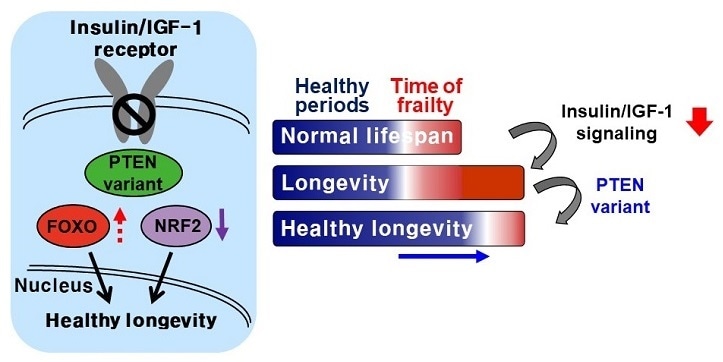Numerous aging researchers are creating strategies to enhance health spans, the time of life spent with good health, void of disabilities and chronic diseases. Scientists from KAIST put forth novel insights for enhancing the health span by controlling a protein’s activity.

Schematic view of the research. Image Credit: The Korea Advanced Institute of Science and Technology.
A team of scientists headed by Professor Seung-Jae V. Lee from the Department of Biological Sciences pinpointed a single amino acid change in the tumor suppressor protein phosphatase and tensin homolog (PTEN) that considerably extends healthy periods while retaining longevity.
The current research underlines the significance of the well-conserved tumor suppressor protein PTEN in health span regulation, which could be focused to create therapies for promoting healthy longevity in humans. The study was published on September 24th, 2021, in the Nature Communications journal.
Insulin and insulin-like growth factor-1 (IGF-1) signaling (IIS) is one among the evolutionarily conserved aging-modulatory pathways. It is found in life forms from tiny roundworms to humans.
The proper decrease of IIS leads to longevity in animals; however, it also causes shortcomings in multiple health parameters including reproduction, impaired motility, and growth.
The scientists identified that a specific amino acid change in the PTEN protein enhances health status while maintaining the longevity accorded by decreased IIS. The researchers used the roundworm C. elegans—an animal model animal used widely for aging research, owing to its very short normal lifespan (around two-three weeks).
The PTEN protein is a phosphatase that eliminates phosphate from lipids and proteins. Intriguingly, the recently discovered amino acid change exquisitely recalibrated the IIS by moderately retaining protein phosphatase activity while decreasing lipid phosphatase activity.
Consequently, the amino acid alteration in the PTEN protein retained the activity of the longevity-promoting transcription factor Forkhead Box O (FOXO) protein. It also restricted the detrimental upregulation of another transcription factor—NRF2—resulting in a healthy and long life in animals with decreased IIS.
Our study raises the exciting possibility of simultaneously promoting longevity and health in humans by slightly tweaking the activity of one protein, PTEN.”
Seung-Jae V. Lee, Professor, Department of Biological Sciences, The Korea Advanced Institute of Science and Technology
Source:
Journal reference:
Park, H.-E. H., et al. (2021) A PTEN variant uncouples longevity from impaired fitness in Caenorhabditis elegans with reduced insulin/IGF-1 signaling. Nature Communications. doi.org/10.1038/s41467-021-25920-w.